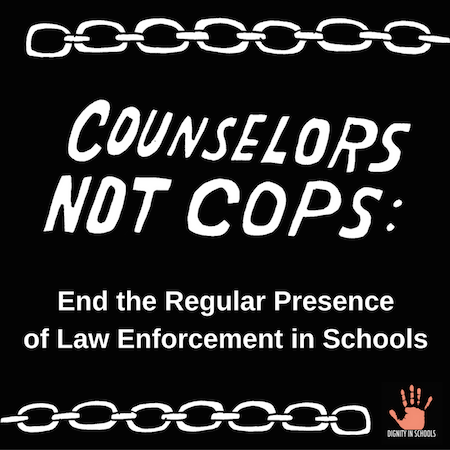National Coalition Dignity in Schools Campaign Calls for Removal of Police from Schools

Today, Dignity in Schools Campaign (DSC) released the policy platform, Counselors Not Cops: Ending the Regular Presence of Law Enforcement in Schools. The DSC is a national coalition of over 100 organizations in 27 states and the District of Columbia representing students, parents, advocates and educators that promote alternatives to a culture of zero-tolerance, punishment, criminalization and the dismantling of public schools.
The presence of police in schools has escalated dramatically in the last several decades, and the figures on arrests and referrals to law enforcement show disproportionate targeting of Black and Latino students and students with disabilities. This is just one aspect of the school-to-prison pipeline, where some students are denied an opportunity to succeed, and instead are pushed out of school and into the juvenile or criminal justice system.
The DSC has developed recommendations for schools, districts, states and federal policy-makers to:
1) End the Regular Presence of Law Enforcement in Schools – DSC calls for removal of any law enforcement personnel assigned to be present on a regular basis in schools, including sworn officers (and unsworn if they are armed security), municipal police officers, school police officers, school resource officers (SROs), sheriff’s deputies, parole and probation officers, tribal officers, truancy officers, ICE officers or other immigration officials and armed security guards.
2) Create Safe Schools through Positive Safety and Discipline Measures – Instead, school staff trained to ensure safe and positive school climates, such as community intervention workers, peacebuilders, behavior interventionists, transformative or restorative justice coordinators, school aides, counselors and other support staff, can and do prevent and address safety concerns and conflicts.
3) Restrict the Role of Law Enforcement that are Called in to Schools – On those rare occasions when it is appropriate for law enforcement to enter a school building, there should be agreements with police departments that limit the cases when law enforcement can be called in to a school, with particular safeguards in place to ensure students’ rights are protected.
You can read the detailed DSC Policy Recommendations here.
You can also find a Resource Guide with FAQs, data and information on positive alternatives to police in schools here and ourinteractive webpage that walks you through the recommendations here.
Today, at congressional briefings on “Examining the Role of Police in Schools” co-sponsored by Senator Chris Murphy (CT) and Representative G.K. Butterfield (NC), students, parents, advocates and researchers will share personal stories about interactions with school police, research and data on the impact of police in schools, examples of best practices for creating positive school climates and policy recommendations.
The Senate briefing will take place from 12:00-1:00pm in SVC 215 at the Capitol Visitors Center, where DSC members from North Carolina, Illinois, Pennsylvania and Texas will be joined by Tanya Clay House from the U.S. Department of Education and researcher Dr. Carla Shedd from Columbia University.
The House briefing will take place from 3:30-4:30pm in Room 2103 at the Rayburn Building, featuring youth and parent leaders from California and Minnesota and Dr. Carla Shedd from Columbia University.
The DSC will also host a press teleconference call from 10:00 a.m. – 11:00 a.m. EST, featuring a summary of the DSC policy recommendations and presentations from member organizations of the coalition from across the country who are actively campaigning to limit the role of police in schools, including Coleman Advocates for Children and Youth and Public Counsel in California, the Minnesota Education Equity Partnership and Minnesota Solutions Not Suspension Coalition, Texas Appleseed and the ACLU of Pennsylvania and Gwinnett SToPP in Georgia.
You can join the press call at 10:00 a.m. EST by dialing 888-585-9008, with conference ID #: 919-494-991. Please RSVP with our communications coordinator Nancy Treviño at .
